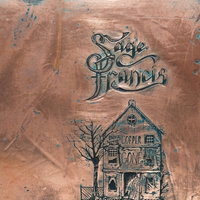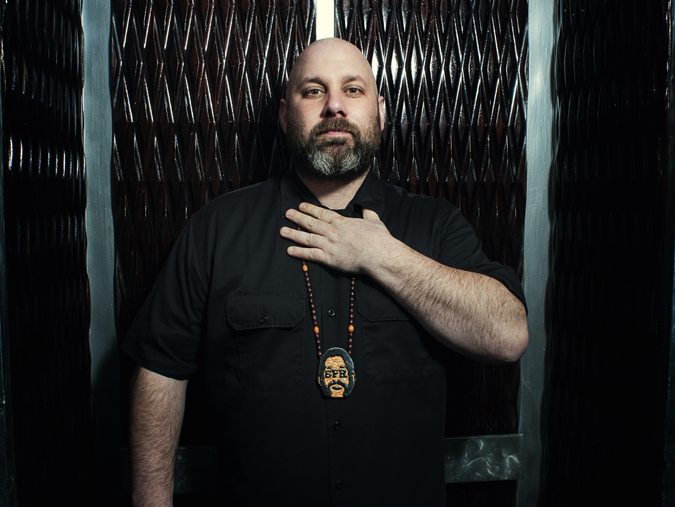 Sage Francis: Copper Gone (Strange Famous, 6/3/14)
Sage Francis: Copper Gone (Strange Famous, 6/3/14)
“Vonnegut Busy”
He’s back. After four years in the woods of Rhode Island, producing records and growing out his epic beard, Strange Famous president and elder statesman of independent hip hop Sage Francis returned to the studio to record his new album, Copper Gone—a heart-on-its-sleeve banger that’s sure to be etched with acid into your eardrums.
Following Li(f)e, a 12-track collaboration with some of indie rock and folk’s finer musicians, Francis formed the basis of Copper Gone on punchier production and electronic drums. Now without ties to another label, the bearded one talks about his return, the business side of being independent, and Macklemore’s lack of recognition for his predecessors.
You’ve said in interviews and in press for this album that you were dealing with some pretty heavy stuff before or during its creation. What brought you back to recording?
That’s a tough question to answer because there’s so much to address. But basically, it was just time. Everything had pointed toward me doing it again. I had nothing else. I’m sitting on all these songs that I write and that I knew worked, and I decided, “Okay, I’m gonna go at this again,” the way I have with all the other discs.
But every time I do an album, I know how much it takes out of me, just how agonizing the whole process is. Not just the act of recording the album or writing it, but everything that goes along with it: all the stress and anxiety, planning out a full year of your life, knowing everything that has to get done.
People fucking talk about [being] independent, but [you need] to really know each side of the business you’re going to have to take on when you go at a project of this magnitude. So much money is going to be spent, and if you don’t get that back, you’re dead in the water. Ultimately, you want to make more so you can do more records—but once you have enough money to make more records, you ask yourself, “Do I really want to put myself through that shit again?”
I did that for ten years straight, and then I took that four-year break because I thought maybe I can try to have a domestic life of some sort. Maybe it’s time to try to build a family or really try and see if I can be happy like I think other people enjoy regular-life shit. And it just wasn’t happening, so you know, fuck trying to force that.
You said that people say “independent” but don’t really know what goes into that. Is that what the track “ID Thieves” deals with?
Well, yeah, to a degree, because that’s people adopting language and ideas and turning them into buzzwords. It kind of gets sour when you understand, really, what the fuck’s been going on all this time. If someone says independent, I know what they mean, but I also know what other people think they mean. It’s that difference that sort of frustrates me sometimes.
There’s that last sound bite on that track, where you say, “Independent? Fuck you.”
That was a total ad-lib of me stepping away from the mic, and I decided to keep it because it was one of those things that just came out of my mouth. I liked the way it sounded like something you’d hear in a Rhode Island bar or some shit.

So: The Macklemore question, particularly that “Vine” you did regarding “Same Love” and “The Best of Times.” There was a comedian on the AV Club who recently said, “Macklemore sounds like Asher Roth if he got really into Sage Francis.” Where do you fall on this?
That article that you just referenced is the chatter that has been happening behind the scenes for quite a while, and it was so funny to see him (Joe Mande) put it all out there. A comedian had to do it. If I did it, if anyone else did it, if any of us did it—not even in a hateful way but just saying plainly, “Yo, this is kind of a corny approach,” and he’s sold out something he doesn’t own in a weird way.
I guess he did pay his dues—everyone is always quick to tell me about all of his stuff, that he’s a great dude. Maybe he is. He follows me on Twitter, and I follow him back, so that’s our connection. I know he listens to me; I know he’s been a fan of mine; I know he’s been a fan of Atmosphere. But in all the success he’s obtained, he’s never given any kind of recognition, which I think is kind of weird, because he’s definitely adopted a style that we blazed many years back.
It’s not just me and Atmosphere. There’s a lot of people who put their asses on the line. It’s just weird because now when people hear “The Best of Times,” they hear a song of mine like that and they relate it to Macklemore. “Oh, he sounds like Macklemore.” No, motherfucker. Please reverse that sentence. But how could we ever tell enough people that? So we sit back, we may make comments and snicker from time to time, but really, we’re just moving forward, doing our thing. I’m just going to go at my music the way I always have, and I think in due time, people will be able to make sense of what was what.
Is there any takeaway that you want fans to get from this album?
I think that when people listen to this, I’d like them to sense the deep love and appreciation for hip hop, even when I do some off-the-wall or experimental shit. This is a flat-out, straight-up hip-hop record, with unique shit included—stuff that doesn’t happen often in hip-hop, stuff that maybe a lot of hip-hop listeners aren’t comfortable with.
Another reason why I make records, another reason why I write, is to document my human experience. I’m not trying to tell someone else’s story—I don’t understand it. There are some unique things happening in my life, and the kind of things that I go through I think I can express in a certain way that other people can understand or identify with. So I hope it entertains, but I also hope it consoles in certain ways.

